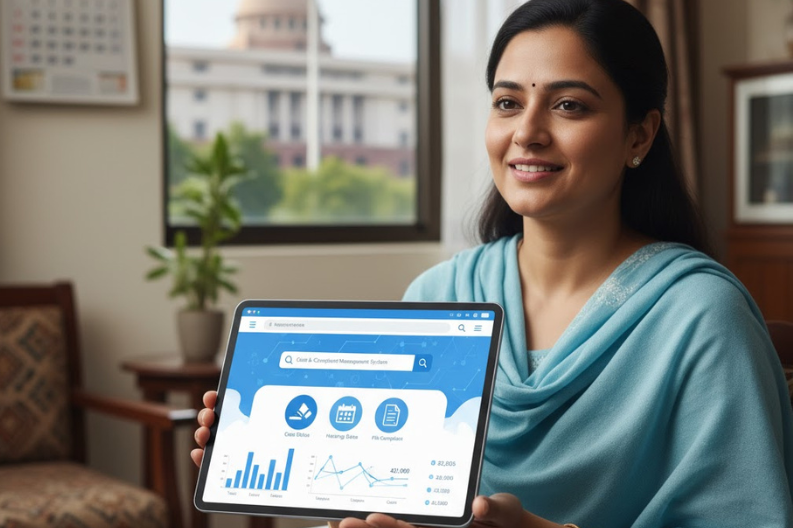New online portal launches for Court case monitoring in Ghaziabad, introducing the Case and Complaint Management System (CCMS) to help citizens track their legal matters. This digital platform allows people to check case status and hearing dates conveniently from their homes. Moreover, the system covers approximately 32,555 cases involving around 42,000 litigants across 16 courts. This initiative represents a significant step toward modernizing legal proceedings and improving accessibility for common citizens.
The CCMS portal serves cases handled by Assistant Commissioner of Police (ACP), Deputy Commissioner of Police (DCP), and additional police commissioners. Consequently, litigants no longer need to visit courts repeatedly just to check their case status. Instead, they can simply log into the portal and access all relevant information. Furthermore, the system provides hearing schedules, helping people plan their court appearances efficiently.
Commissioner of Police J Ravinder Goud highlighted the portal’s multiple benefits. “With the CCMS portal in place, the litigants will be benefitted, while the senior officials, through a dashboard, will be able to monitor the cases,” he explained. Additionally, the system helps identify fake guarantors who submit documents in multiple cases. Therefore, this technology strengthens the integrity of the judicial process.
Executive magistrates in Ghaziabad handle various types of cases under different legal sections. Section 126 deals with preventive measures to avoid potential problems. Meanwhile, Section 129 addresses bonds against repeat offenders. Furthermore, Section 152 covers orders to remove public nuisances. Additionally, Section 164 handles disputes that might lead to community unrest, while Section 170 deals with arrests preventing serious crimes.
Currently, the portal does not provide final order sheets or copies of court rulings. However, authorities plan to add these features as the system gains popularity. Moreover, they will introduce additional functionalities based on user feedback. Therefore, the portal will continue improving to serve citizens better over time.
Since April, Ghaziabad police have launched several citizen-centric initiatives alongside the CCMS portal. They now deliver First Information Reports (FIRs) directly to complainants’ homes. Consequently, people save time and avoid unnecessary trips to police stations. This home delivery service has proven extremely popular among residents.
Every Wednesday, police stations conduct ‘Vaadi Samvad Diwas’ sessions where officers listen to citizen complaints. During these meetings, people can raise concerns about their case investigations. Furthermore, officers provide updates and clarifications about ongoing matters. This regular communication channel strengthens trust between police and community members.
The police department also established a feedback cell to collect public opinions about their services. Since launching these initiatives, authorities have delivered 5,631 FIRs to citizens’ doorsteps. Additionally, they received 56,231 feedback responses until November 16. Interestingly, only 39 responses were negative, indicating high satisfaction levels. Nevertheless, police took corrective action on all negative feedback promptly.
Technology integration has transformed how Ghaziabad police interact with citizens. The CCMS portal exemplifies how digital solutions can improve government services significantly. Moreover, it reduces corruption opportunities by making processes transparent and trackable. Therefore, both citizens and honest officials benefit from this technological advancement.
The dashboard feature allows senior officials to monitor pending cases systematically. They can identify bottlenecks and take corrective actions quickly. Furthermore, this oversight ensures cases move forward without unnecessary delays. Additionally, officials can analyze patterns and allocate resources more effectively based on data insights.
Legal experts praise the initiative for improving access to justice. Many citizens, especially those from economically weaker sections, struggle to track their cases due to limited resources. However, the online portal levels the playing field considerably. Moreover, it reduces the need for middlemen who often exploit uninformed litigants.
The portal’s user interface has been designed with simplicity in mind. Even people with basic digital literacy can navigate the system easily. Furthermore, instructions are provided in multiple languages to ensure wider accessibility. Additionally, help desks assist users who face difficulties operating the portal.
Future enhancements may include mobile app versions for greater convenience. SMS alerts about hearing dates could also be added. Moreover, integration with national judicial databases might provide comprehensive legal information. Therefore, the system’s potential extends far beyond its current capabilities.
Community response to these reforms has been overwhelmingly positive. Residents appreciate the police department’s efforts to modernize and improve transparency. Furthermore, they feel more confident about receiving fair treatment in legal matters. This growing trust encourages more people to approach police when needed.
In conclusion, new online portal launches for Court case monitoring marks a transformative moment for Ghaziabad’s judicial system. Through technology integration, citizen feedback mechanisms, and transparent processes, authorities are building a more accountable system. Ultimately, these reforms demonstrate how innovation can make justice more accessible to everyone.



